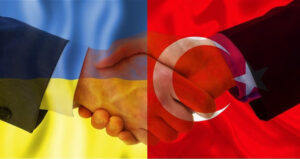
Ukraine is ready to expand cooperation in the livestock market with Turkey, Minister of Agrarian Policy and Food Vitaliy Koval said following talks with Turkish Trade Minister Omer Bolat.
The minister noted that the meeting in Istanbul was attended by about 50 Turkish companies, including the largest agricultural producers of feed, meat products, food products, and food warehouses.
“I told them about the priorities of the Ministry of Agrarian Policy: the development of livestock and deep processing. I invited Turkish business to invest in the construction of processing plants in Ukraine. I am sure that their agro-processing companies can find new high-quality markets for their business in Ukraine. This will be beneficial for both countries,” Koval emphasized.
According to him, cooperation between Ukraine and Turkey is at a good level. Turkey is Ukraine’s fourth largest trade partner. The trade turnover of agricultural products between Ukraine and Turkey amounted to $2.2 billion in 2024. Ukraine exported $1.6 billion worth of products to Turkey. Among the most popular are traditional Ukrainian agricultural crops: corn, sunflower oil, soybeans, sugar, and more.
The Minister of Agrarian Policy assured that Ukraine and Turkey will continue to develop cooperation, not only at the level of governments but also business associations.

The US president said that Ukraine could “negotiate” to prevent war.
Earlier, US President Donald Trump said that elections should be held in Ukraine, as incumbent President Volodymyr Zelenskyy allegedly has a low rating, and that Russia allegedly wants the war to end.
“Now we have a situation in Ukraine where there have been no elections for a long time. Martial law has been introduced there. And the Ukrainian leader now, no matter how sad I am to say it, has 4% support,” Trump said at a press conference in Mar-a-Lago following the US-Russia talks in Riyadh on February 18.
According to him, it is not Russia that is demanding elections in Ukraine, but an “objective situation” because there have been no elections for a long time.
It is not yet clear where Trump got these sociological data from.
The US president also says that Russia is desperate to “stop” the war.

In 2024, Lemtrans, Ukraine’s largest private rail transportation operator, increased its investments by 2.9 times compared to 2023 to UAH 478 million, while total transportation volume decreased by 6% to 15.9 million tons.
“Lemtrans continues to work to ensure the logistics and economic stability of Ukraine by supplying critical raw materials and investing in new infrastructure projects… In 2024, the group allocated more than UAH 478 million for infrastructure and logistics projects, which is three times higher than in 2023, when investments amounted to more than UAH 160 million,” Lemtrans’ press service said on Tuesday.
The company has invested in the development of terminals and container business, allocating UAH 441 million in this area, the statement said.
In the second half of 2023, the construction of a modern container terminal in Vinnytsia was completed. Lemtrans also continued to implement an investment program aimed at maintaining the railcar fleet and further improving the efficiency of railcar repair facilities. The volume of scheduled and current repairs of freight cars in 2024 reached 5,635 units.
Lemtrans’ total transportation volume in 2024 amounted to 15.9 million tons, which is 6% less than in 2023, the press service reported.
Coal accounted for the bulk of transportation – 10.9 million tons. Iron ore was the second largest (2.3 million tons). In addition, the company transported 2.01 million tons of construction materials and 0.6 million tons of other cargo in 2024, the report said.
“Starting from the third quarter, coal transportation decreased due to the massive attacks by Russia on Ukraine’s energy infrastructure. Damage to production assets led to a reduction in transportation volumes by shippers,” the company’s press service explained.
Based on the results of their activities in 2024, the companies that are part of the Lemtrans group transferred more than UAH 712 million in taxes and fees to the budgets of all levels. This is 30% less than in 2023, when UAH 929 million was paid.
“In 2024, Lemtrans transferred about UAH 647 million to the state budget. Local budgets were replenished by UAH 66 million. In addition, Lemtrans Group paid more than UAH 59 million in unified social tax, the press service said.
“Despite the challenges of wartime, we continue to invest in infrastructure projects… The container terminal in Vinnytsia expands the access of Ukrainian enterprises to world markets, contributing to the growth of export-import operations and strengthening the economic potential of both the region and the country as a whole. This is especially important in the current environment, when economic sustainability is a key factor for Ukraine,” Lemtrans CEO Volodymyr Mezentsev said, as quoted by the press service.
Earlier it was reported that Yegor Grebennikov, co-owner of the port operator Transinvestservice (TIS), will become a co-owner of the Mostyska Dry Port project in Vinnytsia, which Lemtrans is implementing jointly with Rail Investment. The relevant permission was granted by the Antimonopoly Committee.

The United States and Russia have agreed on four principles after talks that lasted more than four hours in Saudi Arabia, US Secretary of State Marco Rubio said on Tuesday, CNN reported. The senior official listed them.
“Restore the functionality of our respective missions in Washington and Moscow. In order for us to continue down this path, we have to have diplomatic institutions that are open and functioning properly,” he said.
“We’re going to appoint a high-level team from our side to help negotiate and work to end the conflict in Ukraine in a way that is lasting and acceptable to all parties involved,” Rubio said.
“To begin discussing, contemplating and exploring both geopolitical and economic cooperation that could result from an end to the conflict in Ukraine,” the Secretary of State added.
“The five of us who were here today… will continue to be engaged in this process to make sure it moves forward in a productive way,” the State Department head summarized.
The five people Rubio mentioned were himself, National Security Advisor Mike Waltz, Special Envoy Steve Vitkoff, as well as Russian Foreign Minister Sergey Lavrov and presidential aide Yuri Ushakov.
“President Trump wants to stop the killing; the United States wants peace and is using its power in the world to bring countries together. President Trump is the only leader in the world who can convince Ukraine and Russia to agree to this,” Rubio added.
The secretary of state also said that “one phone call followed by one meeting is not enough to establish a lasting peace. We must act, and today we took an important step forward.”
Rubio expressed his gratitude to the Kingdom of Saudi Arabia for hosting him under the leadership of Crown Prince Mohammed bin Salman Al Saud.
As reported, on Tuesday, the first round of talks between US and Russian officials took place in Riyadh (Saudi Arabia), which lasted more than four hours. As previously reported by the media, the main topic of the talks should be the end of the Russian war in Ukraine.

In 2025, Metinvest Mining and Metallurgical Group will invest almost UAH 5.7 billion in the development of its Kryvyi Rih mining and processing plants – Central, Ingulets and Northern mining and processing plants (MPPs), which were transformed into United Mining and Processing Plant (UMPP).
According to the press release, Metinvest will invest in the development of Kryvyi Rih mining and processing plants in 2025. The main investments will be aimed at maintaining key equipment, creating alternative sources of electricity and creating safe and comfortable workplaces. The company more than doubled its investments in iron ore assets compared to last year.
The largest part of the investments will be allocated for major repairs of equipment and facilities of the plants – more than UAH 1 billion. Investment projects are being implemented here to ensure the stability of production processes, reliable operation of transport and key equipment, and the fulfillment of product quality indicators to maintain competitive positions and reduce the cost of iron ore production. Funds are also planned for major overhauls of mining and processing equipment and power equipment.
Energy independence is also one of the priorities for the year to minimize technological risks for enterprises in the event of possible power outages. To this end, Northern and Central GOKs are planning to build gas reciprocating power plants with a total capacity of about 20 MW and solar generation with a capacity of 23 MW. A total of UAH 1.3 billion will be allocated for these projects.
“In 2025, the volume of investments in Kryvyi Rih GOKs will be increased, and like last year, the company’s investment strategy is focused primarily on maintaining the enterprises’ performance. As the war continues, the implementation of large-scale investment projects to modernize and build new production facilities in Ukraine is very limited. However, despite the difficult situation, the company continues to invest in development, adjusting its expenditure items to meet the needs and challenges of the day. For example, at GOKs, the key investment focus of the year is not only to maintain facilities and the fleet of operating equipment, but also to create energy autonomy for mining enterprises,” said Dmitry Nepomnyashchy, Director of Capital Construction and Investments at Metinvest GOKs.
In addition, in 2025, the active phase of the strategic project for the thickening of beneficiation waste at Pivdennyi GOK begins – this large-scale project is aimed at ensuring the transportation of thickened tailings to higher tailings storage levels after 2026. Additionally, it will reduce energy costs. In 2025, the company plans to spend UAH 1.4 billion.
The program to improve working conditions also remains relevant. This year, UAH 70 million will be allocated to create workplace conditions, including major repairs of amenity facilities in the administrative and amenity complexes of the plants’ structural units.
As reported earlier, Metinvest has implemented a new model for its Kryvyi Rih mining and processing facilities, bringing together its mining and processing plants in Kryvyi Rih under a single management.
“Metinvest comprises mining and metallurgical enterprises located in Ukraine, Europe and the United States. Its major shareholders are SCM Group (71.24%) and Smart Holding (23.76%), which jointly manage it.
Metinvest Holding LLC is the management company of Metinvest Group.